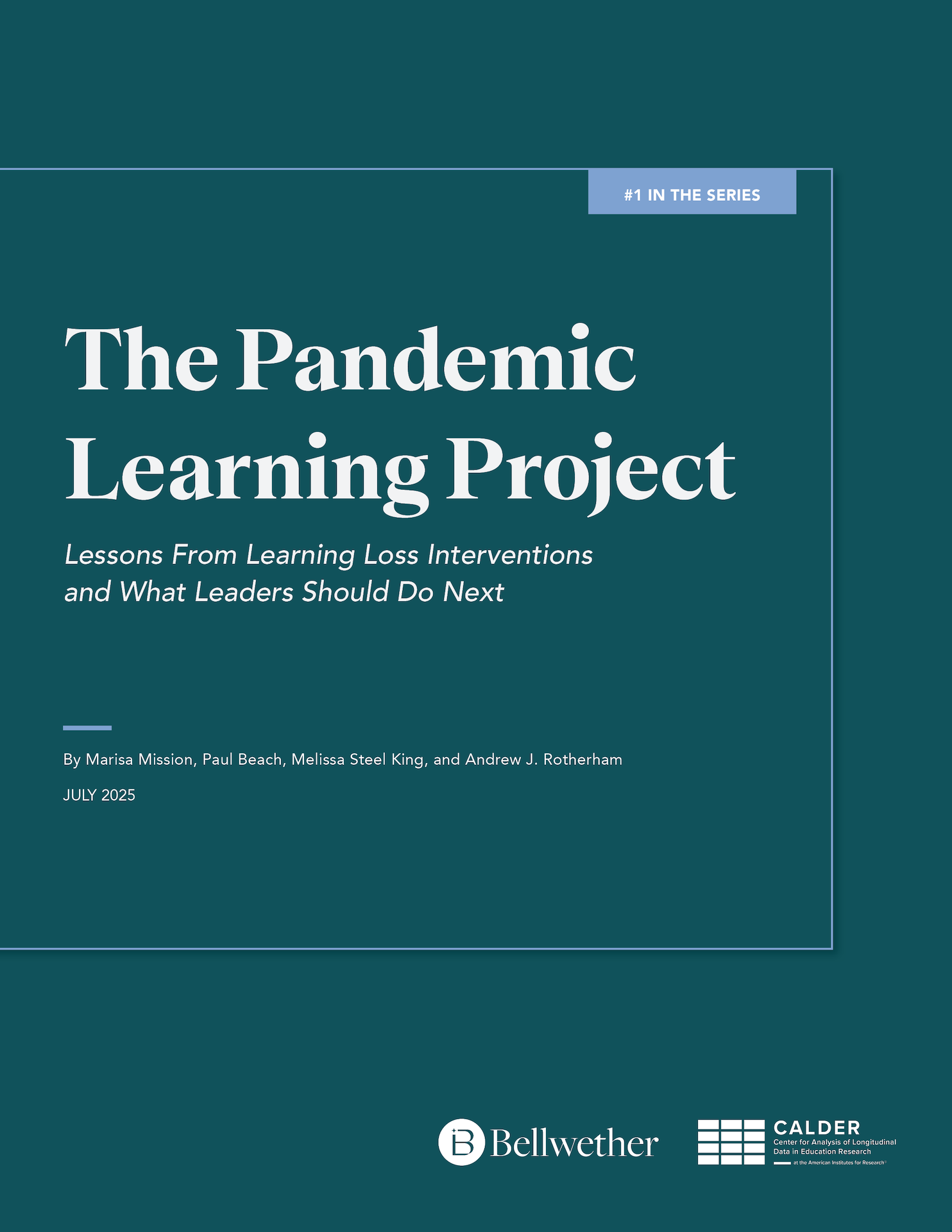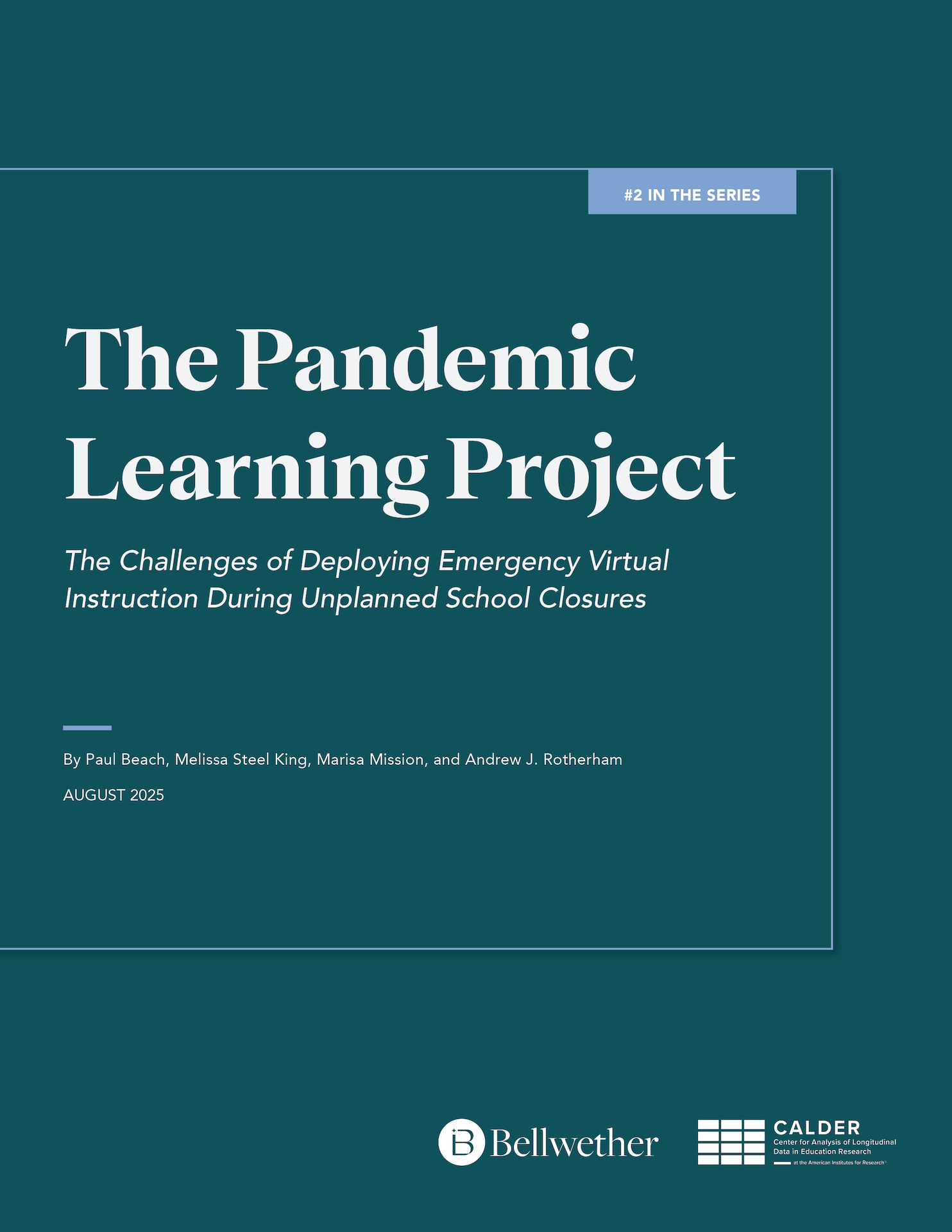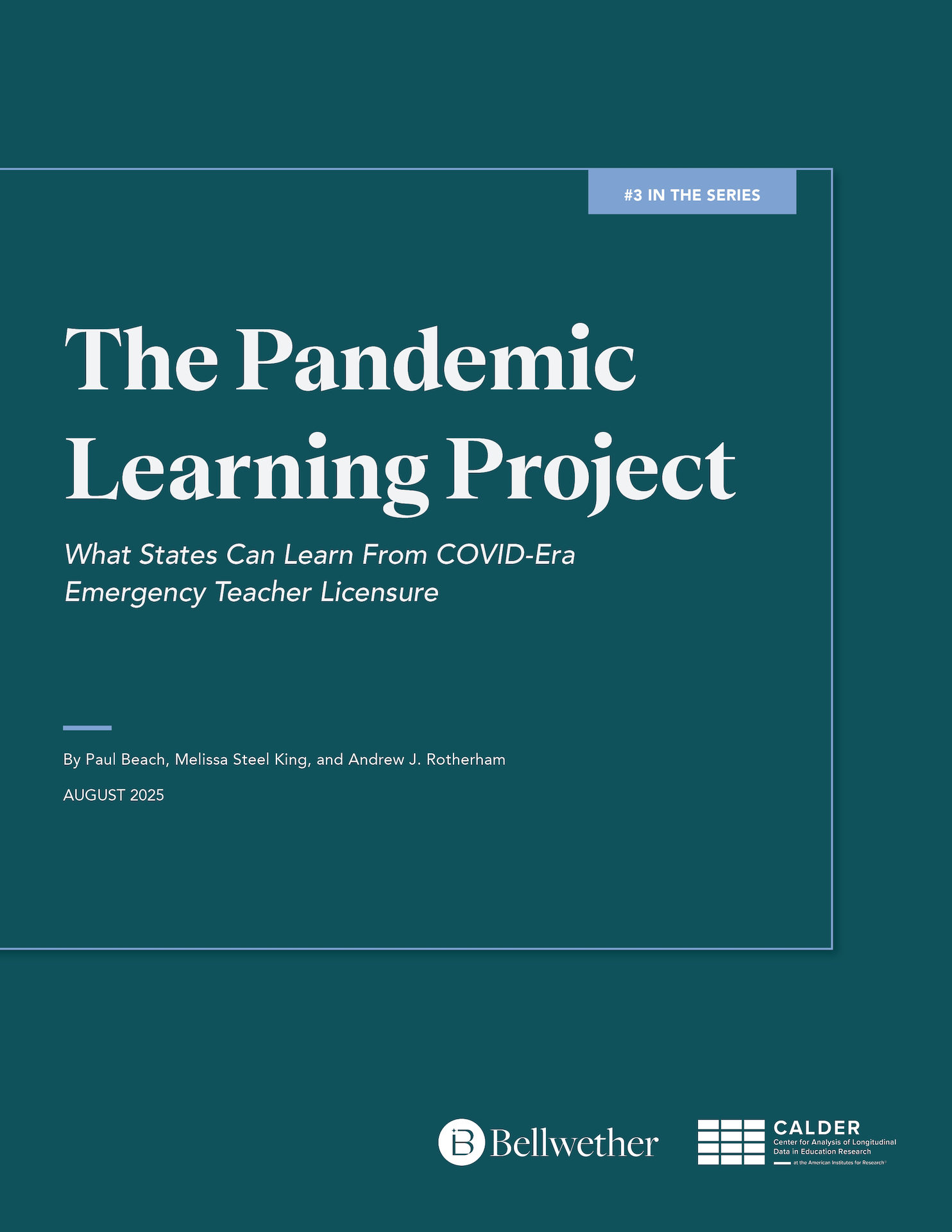The Pandemic Learning Project
Using Research on COVID-Era Policy Change to Strengthen K-12 Education
Series Overview
The unprecedented disruptions caused by the COVID-19 pandemic forced state and district leaders to make rapid and sweeping changes to education policy and practice. From orchestrating systemwide shifts to virtual instruction to temporarily waiving licensure requirements to implementing academic recovery interventions on an unprecedented scale, leaders had to act decisively — often with limited time to prepare or review research.
While the urgency and magnitude of these policy changes presented real challenges — and subsequent consequences for students that are now well documented — they also created an exceptional opportunity to learn from the past. These unplanned policy shifts produced numerous natural experiments that allow researchers to explore what worked for students, teachers, and schools; what did not; and what lessons can be drawn to help leaders make more deliberate and effective policy decisions in the future.
Bellwether partnered with the Center for Analysis of Longitudinal Data in Education Research (CALDER) at the American Institutes for Research to examine how pandemic-era research can support state and local leaders in navigating K-12 policy challenges now and into the future.
The reports in The Pandemic Learning Project series cover three policy areas:
These reports aim to synthesize the best available evidence and translate it into actionable guidance and recommendations for state and district leaders. The reports provide a high-level overview of different approaches that states and districts have taken in each policy area, explore the trade-offs and contextual factors influencing those approaches, and highlight key considerations that can strengthen policy effectiveness. Each report also includes a set of recommendations and/or essential questions that state and district leaders should consider as they weigh different options and make policy decisions during future times of crisis to support academic recovery, improve teacher quality, and build more resilient education systems.
Using Research to Shape Stronger Policy
Bridging the gap between research and policy is challenging, and connecting the two is rarely a linear or predictable process. Policymaking itself is often iterative and time-consuming, as legislators, state agency officials, district leaders, and their advisers absorb information on an issue across time, continually form judgments based on that information, and act when opportunities for policy change arise.1 In this fluid environment, research plays a critical role, not by prescribing specific actions, but by informing ongoing decision-making. With that in mind, the guidance and recommendations offered throughout this series are meant to serve as a tool to support policymakers and their advisers as they engage with the best available evidence, adapt that evidence to their context, and iterate on policy design.
Research also shows that translating and contextualizing research findings to fit local needs and priorities is essential for evidence to meaningfully inform policy.2 Academic researchers, policy analysts, and consultants play a critical role in this process by producing policy-relevant, rigorous research and analysis aligned with the goals and priorities of leaders and their communities, and by communicating findings using clear language. These reports are designed to support that role by accelerating the information-gathering process, distilling complex research into clear takeaways, and offering pragmatic guidance that can inform evidence-based decision-making.
Research and analysis alone do not drive policy change. Reports like these are just one input among many in a complex decision-making environment shaped by politics, deeply held values, competing interests, and scarce resources. What rigorous research and policy analysis can do, however, is cut through the noise. By establishing a shared set of facts, highlighting the key trade-offs that policymakers will confront, and anticipating potential unintended consequences, research and policy analysis can help leaders navigate complex choices with greater clarity and confidence.
Through this lens, The Pandemic Learning Project series is not intended to provide definitive answers, but to serve as a starting point for gathering more information on how these policy issues play out in different contexts, and what lessons can be drawn from the past. This series invites leaders to use research as a catalyst for deeper reflection and more strategic action. By rigorously studying these natural experiments and applying the insights to policymaking, state and district leaders have an opportunity to address persistent learning loss and help millions of students get back on track before the window for academic recovery closes while also creating education systems that are better prepared for future crises.
Endnotes
- Carrie Conway, “Maximizing Research Use in the World We Actually Live In: Relationships, Organizations, and Interpretation,” Education Finance and Policy 15, no. 1 (2020): 1–10, https://doi.org/10.1162/edfp_a_00299.
- Hayley Weddle, “Developing a Research–Practice Partnership With Policy Intermediaries: An Examination of Collaboration With State Education Agency Leaders,” Educational Evaluation and Policy Analysis 47, no. 2 (2023): 311–328, https://doi.org/10.3102/01623737231213082.
Acknowledgments, About the Authors, About Bellwether and CALDER
Acknowledgments
We would like to thank the experts who gave their time and shared their knowledge with us to inform our work, including Dan Goldhaber, Michael DeArmond, Ashley Jochim, Sonya Stephens, Susan Kemper Patrick, Heather Peske, and Victoria Van Cleef. We also wish to thank the Carnegie Corporation of New York, The Joyce Foundation, and the Walton Family Foundation for their financial support of this project.
We would also like to thank our Bellwether colleagues Jim Peyser and Biko McMillan for their input and Temim Fruchter and Stephanie Escobar Thon for their support. Thank you to Amy Ribock, Kate Stein, Andy Jacob, McKenzie Maxson, Zoe Cuddy, Julie Nguyen, Mandy Berman, and Amber Walker for shepherding and disseminating this work, and Super Copy Editors.
The contributions of these individuals and entities significantly enhanced our work; however, any errors in fact or analysis remain the responsibility of the authors. In addition, opinions expressed in this report are those of the authors alone and do not reflect those of CALDER or the funders of this work.
About the Authors

Paul Beach

Melissa Steel King

Marisa Mission

Andrew J. Rotherham

Bellwether is a national nonprofit that exists to transform education to ensure systemically marginalized young people achieve outcomes that lead to fulfilling lives and flourishing communities. Founded in 2010, we work hand in hand with education leaders and organizations to accelerate their impact, inform and influence policy and program design, and share what we learn along the way. For more, visit bellwether.org.

The Center for Analysis of Longitudinal Data in Education Research (CALDER) is a joint project of the American Institutes for Research and scholars at 12 universities. CALDER’s researchers and affiliated scholars are national experts on a range of critical issues — including educator labor markets, teacher education, and academic interventions. With data-sharing agreements in over 10 states, CALDER leverages statewide longitudinal data systems to develop systematic, quantitative evidence on how teachers and schools impact student learning and success. For more about CALDER and to read their latest publications, visit caldercenter.org.



